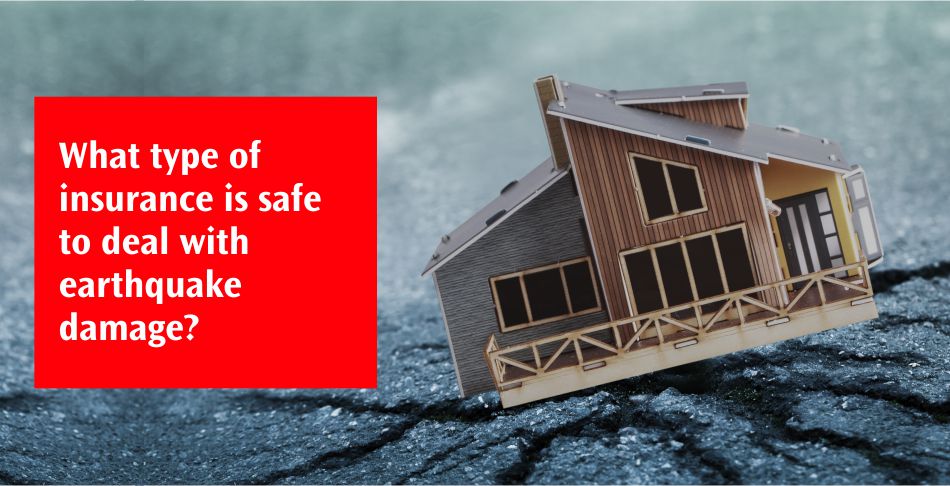What type of insurance is safe to deal with earthquake damage?
What type of insurance is safe to deal with earthquake damage?
Published on April 19, 2021. EST READ TIME: 3 minutes

Earthquakes and other natural calamities have long been a source of concern in India. Many people have been affected by the ground shifting beneath their feet.
Gujarat was struck by a 7.7 magnitude earthquake in 2001. Because it was January 26, the losses were extremely high. Because of the Republic Day holiday, people were confined to their indoors. More than 20,000 people were killed and over 1.67 lakh were injured as a result of the earthquake. Over 3.4 lakh structures were destroyed. The government has designated nearly 10 lakh houses for repairs, with the cost of repair and rebuilding estimated to be around USD 1.77 billion.
The Kashmir region was hit by what the experts call the worst earthquake to hit the Indian subcontinent in 2005. The tremors has a moment magnitude of 7.6 and travelled all the way to Tajikistan. More than 1350 people were killed in the state of Jammu and Kashmir.
The worst is yet to come, according to a World Bank and United Nations report, with up to 20 crore people at risk of earthquakes or storms by 2050.
With such a track record, it is critical that every home and property owner in India obtain adequate earthquake insurance. Your home or other property may sustain significant damage in the event of an earthquake. Repairing or rebuilding the same will cost anywhere from tens of lakhs to crores of rupees. This means that an earthquake will cause not only immediate property damage, but also significant long-term financial hardship.
Risks that are covered in earthquake insurance
An earthquake insurance policy can serve as a solid foundation for dealing with the risks posed by such a natural calamity. If you purchase an earthquake policy to protect your property, you will be protected from the following:
Damage caused by fire: In the event of an earthquake, fire can be a significant secondary risk. Such fires can be caused by shorted or severed electric connections, gas leakage, or any other problem. If a fire breaks out, the earthquake insurance will cover both the structure of the house and the contents within it.
Damage caused to the valuables inside the house: There are always valuable items in your home. This includes items made of precious metals as well as jewellery. Your earthquake protection policy will cover any valuables that are lost or damaged up to the defined value.
Risks which need extra protection over and above earthquake insurance
While an earthquake policy can provide you with a lot of protection in the case of a natural calamity, it is not an all inclusive policy. The following are a few risks and costs that are generally not covered by standard earthquake insurance policies.
Floods induced damage: Floods may occur as a result of the earthquake in some cases. The risk of any such post-earthquake floods is generally not covered in the traditional earthquake insurance policy.
Cost of debris removal: The earthquake damage will cause debris to spread or accumulate on the property site. Such debris will have to be removed at the cost of the property owner. Your earthquake insurance will not be able to help you in this situation.
Loss of income from rental property: If you rented out the property for which you purchased earthquake insurance, the policy will not cover the loss of rental income caused by the damage to such insured property. The plan can only the actual cost of the damage.
Fee of surveyors or architects: The plan may limit the fees charged by surveyors, architects, and engineers to 3% of the claim amount. Any fees in excess of the 3% threshold must be borne by the policyholder out of pocket.
Alternative accommodation expenses: An earthquake policy generally does not cover the costs of alternative accommodation, as well as the cost of rent for the place where you will live while the insured property is being repaired.
Loss of Earnings: There may be instances where the policy holder suffers a loss of earnings or other types of indirect losses as a result of the earthquake’s damage to the insured property. Such loss is not covered by the plan.
It should be noted that, like most insurance policies, earthquake insurance has a deductible that is deducted from the policy cover amount.
Conclusion
Obtaining an earthquake insurance policy may appear to be a superfluous choice to many people, but the fact of the matter is that earthquake insurance will be your most important safety shield when you need it.
Disclaimer- The above information is for illustrative purpose only. For more details, please refer to policy wordings and prospectus before concluding the sales.










 Car Insurance
Car Insurance  Bike/Two Wheeler Insurance
Bike/Two Wheeler Insurance  Health Insurance
Health Insurance  Pet Insurance
Pet Insurance
 Travel Insurance
Travel Insurance  Home Insurance
Home Insurance  Cyber Insurance
Cyber Insurance  Third Party Vehicle Ins.
Third Party Vehicle Ins.  Tractor Insurance
Tractor Insurance  Goods Carrying Vehicle Ins.
Goods Carrying Vehicle Ins.  Passenger Carrying Vehicle Ins.
Passenger Carrying Vehicle Ins.  Compulsory Personal Accident Insurance
Compulsory Personal Accident Insurance  Travel Insurance
Travel Insurance  Rural
Rural  Critical illness Insurance
Critical illness Insurance 











